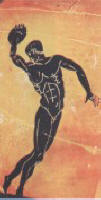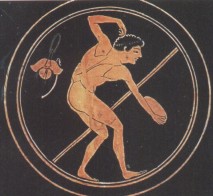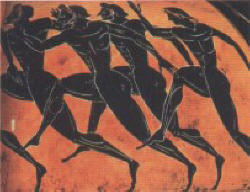|
|
THE OLYMPIC FESTIVAL IN ANTIQUITY

Greatest among the
known religious events in Greek
antiquity was the Olympic Festival,
dedicated to the god Zeus, supreme
head of the ancient Greek Pantheon.
The Olympic Games have their origin
at the site of an important cult
sanctuary at Olympia in the
territory of Elis, 10km inland in
the northwestern Peloponnese. Near
the convergence of two rivers, the
Alpheios and Kladeos, on a low,
pine-covered hill bearing the name
Kronos, the father of Zeus, is an
ancient shrine called Altis, or
‘grove’ in the Elian dialect. A
number of altars located in this
area suggest that at least 6 other
deities enjoyed cult worship here.
From the 10C BC, Olympia imposed its
authority throughout the Greek
world, gradually developing from a
humble cult site to an elaborate
sanctuary complete with temples,
secular buildings, statuary, and
athletic facilities. By 776 BC, the
Olympic Games were being held on a
regular basis for five days, once
every four years, during the hottest
days of summer. Following many
sacrificial offerings, the most
magnificent of which was the
offering of 100 head of cattle at
the altar of Zeus, began a series of
athletic contests in the stadium,
the hippodrome, and other designated
areas at the site. Thousands of
spectators came from all over the
Greek world to witness the games.
Hostilities were suspended for the
duration, which meant that all Greek
city-states could participate. For
however brief the time, under the
sacred mandate of the Games, the
Panhellenic world showcased the
ideals of cooperation and political
unity. The Olympic festival,
therefore, is the paramount symbol
of the spirit and unity of Ancient
Greece.

The athletic
contests, or agonas, held at Olympia
included foot racing, wrestling,
boxing, the pankration, equestrian
events, and the pentathlon (running,
jumping, javelin, discus, and
wrestling). All Greeks, with the
exception of women and slaves, were
allowed to compete. Victory at the
games brought glory not only to the
athletes themselves, but even more
importantly to the city-states they
represented. Athletes were revered
for their physical and moral
virtues. Kpatereia , the high degree
of endurance an athlete demonstrated
during the long training period and
his final performance, was
considered a major virtue. An
athlete was expected to suffer in
silence and exhibit patience and
fortitude in all aspects of his
life. The main concern of
competitors was to succeed in a
balanced development of all physical
and moral values. Victory was the
greatest honor a mortal could
achieve. He ‘agonized’ in honor of
the gods and in thanks gave his
victory to the gods, who were
clearly on his side. The favor of
the gods, along with the wide
recognition afforded to the victors’
cities, was the greatest prize. A
victor was crowned with a wreath of
wild olive and afforded special
honors in his hometow.

The spirit and
intention of the Olympic Festival
changed over its long history. The
dedication of a series of
increasingly more magnificent
temples and other structures
designed to facilitate the growing
number of visitors and to honor the
victorious city-states and athletes
were erected. By the Roman period
the sanctuary had acquired
international fame and enjoyed
Imperial benefits. Gradually, the
bond between religion and athletic
activity waned and the games became
secular events, spectacles and even
performances. The Games were then
instituted in honor of the Roman
Emperors. In 393 AD, at the command
of the Christian Emperor of the
Eastern Empire, Theodosius I, the
Olympic Games met their end. Their
reinstitution in 1896 marked a new
beginning with new meaning for the
formerly sacred Olympic Games.
|